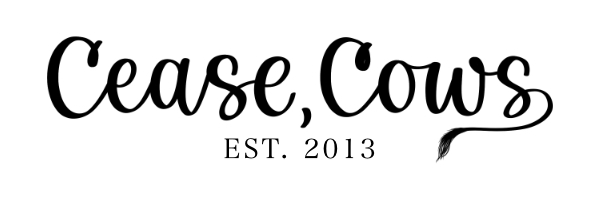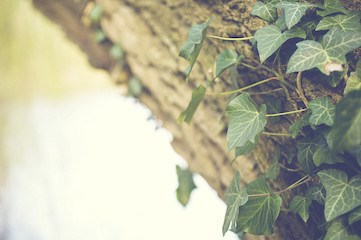As a child, I loved most the English ivy that climbed round the stone wall that encircled the garden. Ivy is an insidious thing, which grows until it is Lord of all. And yet I loved it, loved the way it crisscrossed the brick like the thoughts of a mind before sleep, loved the way it reddened in fall, loved the way its vines clung desperately to the crumbling brick, as I clung to afternoons then, wishing for them to last for days.
And yet, at the periphery of my childhood there lurked a quiet fear. I was afraid of many things: swimming, darkness, silence. I sensed something dangerous that lay just underneath the unknown. I spent a great deal of my early childhood outside in the company of my brother. He was older, and after a time these afternoons were spent alone, sitting on the grass beneath the boughs of an oak with streams of dappled light falling around me, the smell of violets carried by the wind. And just as I’d find myself sinking into the moment beneath the calls of songbirds and idle croaking of crows, I’d be gripped by an intense dread until I found my mother. Such fears are commonplace in childhood, I suppose, and I would have put them behind me but for a summer’s day in my youth.
I was eight and full of hope for the things to come that summer—the hours my brother and I would spend together, the soft note of my mother’s voice as she baked in the kitchen. I would lie on my back beneath large banks of clouds, and imagine my future against the blue of sky.
The garden was partially shaded by a row of chestnuts, and the sun’s light was feathered by the leaves. Inside, our mother was watching television and paying the bills. My brother and I were throwing a small racquetball in the garden, bouncing it off the wall and chasing it down like dogs hunting a fox. I loved this game and my brother as I loved nearly everything then—cars, trains, the sound of a plane overhead, crab apples gathering afternoon light. My brother had outgrown most of our games, and I didn’t see him as much as I’d like, so these afternoons together in the garden filled me with joy.
My older brother cocked his leg and wound up, imitating the pitchers we’d seen on television, dramatically kicking up his leg before sending the ball ricocheting off the stone wall, ping-ponging off iron tables and rusted chairs, skittering beyond the purple flowering Vinca and into a corner of the yard where the ivy held sway. The vines were like corded rope and the leaves plentiful, rich, luminous, and green. Most days, we tried to avoid this spot by stacking chairs in the way, as it often took us half an hour or more to find the ball, but we’d been careless this afternoon.
This portion of my memory is hazy, but I believe my brother went inside to get lemonade, leaving me alone in the yard, sifting through reams of ivy to find the ball. Suddenly, or so it seemed to me, the sun tucked behind a large bank of clouds, and I was standing in a well of darkness. And I felt, as I had many times before, the presence of something foreboding that nearly sent me scurrying inside. And yet, doubting my unrest, which had always proved unfounded, I returned to the task and stepped into the small space created by my outstretched hands.
Beyond the ivy, I saw something inestimably strange—where I usually saw the vestiges of a stone wall I saw a hole instead. And, more astonishing, through that hole I saw a little boy, peering exactly as I was, searching for something lost. The two of us made eye contact, startled, and then we both dropped the ivy. I ran inside to find my mother, but she shooed me away, putting her palm over the phone, and I was left alone with my fear.
I never saw the other boy again, but the image of him, my mirror, my shadow, has lived with me ever since. I think I saw him on my wedding day and at the funeral of my estranged father. But each time I was sure he was there, it turned out to be nothing more than a distant cousin or the play of a tree’s shadows on the wall. Yet he has lived with me ever since, stalking the quiet moments of my day.
And so I lay in bed that night, as I have almost every night since, wondering what the little boy who looked exactly like me was searching for. Was it a blue ball? Or was it something else that had escaped him? And underneath everything I do lays the quiet fear of my childhood, grown with me, like ivy on a wall. Every time I board a plane, or walk down the street, I expect to look up into the eyes of a stranger and find that it’s him, ready to take up my life where I left off, repairing the relationships I’ve fractured, rekindling the loves I’ve lost, living, on this side of the wall, the life I thought would be mine.
–
Andrew Bertaina‘s work has appeared or is forthcoming in many publications including: The Best American Poetry 2018, The ThreePenny Review, Tin House online, Redivider, Crab Orchard Review, and Green Mountains Review. More of his work is available at www.andrewbertaina.com
Lead image: “Ivy” (via Flickr user Jlhopgood)

